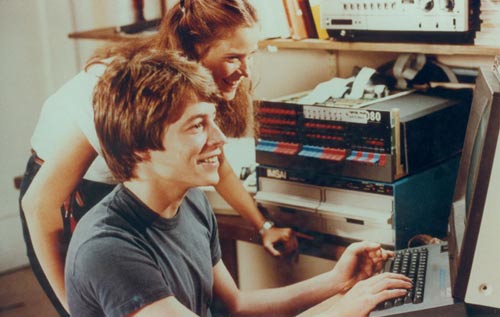
The World Trade Center towers were one of my favorite places in New York. When I visited the city throughout the '90s, I would make a point of heading there around sunset so I could stand on top of the outdoor observation deck and watch the sun slip behind New Jersey and the lights come on all over Manhattan.
It is for this reason and many others that I'm thankful for the new documentary Man on Wire. It's a look back at French high-wire artist Philippe Petit's incredible 1974 achievement: when he and a team of friends and others strung a wire between the very top of the two towers and then Petit walked out into thin air.
The movie is structured around contemporary interviews with Petit and most of the co-conspirators who helped him slip past the towers' security with his high-wire equipment. Petit comes across as both delightful and manic, what you'd expect of someone who spent six years dreaming and planning his most famous conquest. His charisma is also evident in these interviews, as he, in ways both modest and immodest, talks of the difficulties and setbacks he encountered. And when he remarks, "What a beautiful death, to die in the exercise of your passion," we can grasp the passion he's talking about.
This charisma is what drew so many people to his side. And while I had trouble sometimes remembering who was who as the movie cycled through its talking heads, their various perspectives give a striking sense of the monumentality of the project and the cleverness of the team. Petit's girlfriend at the time likens it to a bank robbery, and the movie builds on that tone.
Director James Marsh carefully balances these interviews with re-creations of various moments as well as footage the group took of their preparations. Shots of Petit practicing on a wire in a field give a sense of the joie de vivre he brought to his art, as do high-wire acts in Paris and Sydney.
But it's the World Trade Center project that Petit is known for, and the film carefully builds the suspense leading up to the fateful night when the team sneaked into both towers and the morning when Petit walked out over the city. Even though I knew what happened, the movie is so well edited by Marsh's editor Jinx Godfrey I found myself becoming more and more nervous, more and more excited. If only there had been more footage of the actual event; the same photos, incredible as they are, get repeated as people describe what happened. And the movie's denouement is both a bit confusing (who fell out with whom?) and anti-climactic.
Still, as thrilling as Petit's feat was, what I'll remember most about Man on Wire are the Twin Towers themselves. The image of them falling has been utilized in so many manipulative ways, it feels right to see them snatched out of the hands of politicians and restored as buildings that sometimes inspired dreams.






